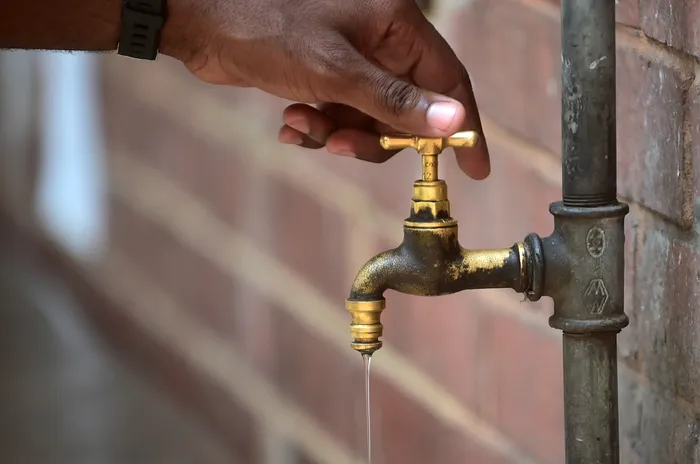From water crisis to collective action: the power of small changes

Every drop counts when your country is running dry
Image: File
South Africa's water crisis isn't a distant threat; it's our daily reality. As I write this, half of Johannesburg's 5.5 million residents are facing water shortages and our country races toward a projected 17% water deficit by 2030.
Yet within this crisis lies an unprecedented opportunity for corporate leadership that can reshape both our water future and our climate impact.
At Tsebo, we discovered this opportunity in the most unlikely place: toilet cleaning protocols across hundreds of healthcare facilities.
What began as an operational efficiency review evolved into a 158-million-litre water conservation success story and a blueprint for how South African businesses can lead through crisis toward climate action.
World Water Week 2025's theme, "Water for Climate Action," couldn't be more relevant for South African companies. We're no longer debating whether to prioritise business continuity or environmental responsibility; they've become inseparable.
Our experience across over 385 client sites revealed how quickly operational innovation can scale to meaningful impact.
By revising our Standard Operating Procedures to flush toilets only once before cleaning and only when visibly dirty, rather than before and after every clean, we achieved a 50% reduction in flushes while maintaining hygiene standards.
This seemingly simple change delivered massive aggregate benefits: 23.8 million weekly flushes were still recorded across sites, but 158 million litres of water were saved in one year.
The significance becomes clear when contextualised within South Africa's water landscape. Our country ranks as the 29th driest globally, with a mean annual precipitation of just 450mm, well below the world average of 860mm.
Yet South Africans consume 234 litres of water daily per person, significantly above the global average of 173 litres.
We're consuming more while having less available, creating an unsustainable trajectory that demands immediate corporate action.
Working in healthcare environments across the country, we've witnessed firsthand how water scarcity threatens patient care.
During Johannesburg's recent water crises, we watched facilities struggle to maintain basic operations.
Dialysis patients couldn't receive treatment when water systems failed. Surgical procedures were postponed when sterilisation became impossible.
The Human Rights Commission linked at least one patient death to water disruptions, a stark reminder that water conservation in healthcare isn't just environmental stewardship: it's patient safety.
Healthcare facilities consume approximately 170–208 litres per square foot annually, making them among the highest water users in commercial real estate.
With cleaning operations representing 5% of hospital water consumption and significantly higher percentages in other commercial facilities, even modest efficiency improvements create substantial benefits. Our toilet cleaning protocol revision demonstrates how targeted operational changes can deliver both immediate water savings and enhanced resilience against future shortages.
Innovation in water saving doesn’t have to be complex — small operational changes can deliver big results. Our revision of the toilet-flushing protocol used existing equipment and systems to achieve significant savings, proving that innovation doesn’t require costly technology.
Beyond this, Tsebo Cleaning and Hygiene Solutions reduces water use through simple measures such as using only enough solution to dampen cloths and sleeves, applying dry-cleaning methods like Masslinn, and choosing microfibre sleeves that need less rinsing and fewer chemicals. Where applicable, we use reusable gloves, clothes, and other durable tools to further cut the need for water-intensive disposables.
This demonstrates that immediate, cost-effective action is possible in any facility — a critical step given that 40% of water is lost due to municipal infrastructure failures before reaching consumers.
World Water Week 2025’s focus on collective action is a timely reminder that everyone has a role to play in protecting this precious resource.
For South African companies, it’s an opportunity to share practical steps, exchange ideas, and learn from others on how to make a meaningful difference in water stewardship, no matter the size of the initiative.
Our 158-million-litre savings represent more than just operational efficiency; they exemplify scalable solutions for national challenges. If replicated across South Africa's commercial and institutional sectors, similar protocol optimisations could save billions of litres annually while creating thousands of jobs in water efficiency services.
The path forward requires recognising water conservation as a crucial infrastructure investment. Companies must integrate water efficiency into their core operations instead of viewing it as a secondary sustainability initiative.
For South African business leaders, the message is clear: water conservation isn't just an environmental responsibility; it's integral to business continuity planning, climate action, and social investment.
As we face projected water deficits and increasing climate pressures, companies that excel in water efficiency will be the ones that survive and thrive in a water-constrained future.
At Tsebo, we've proven that practical innovations can deliver massive aggregate impact while maintaining service quality.
Now it's time for our entire business community to flush away old assumptions and embrace water conservation as the strategic imperative it has become.
Because in a country approaching Day Zero, every drop truly counts, and every company has a role to play in ensuring there's enough water for all.
Corine Goss, Regional Director - Tsebo Cleaning and Hygiene Solutions.

Corine Goss, Regional Director - Tsebo Cleaning and Hygiene Solutions.
Image: Supplied.
BUSINESS REPORT